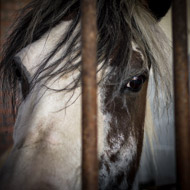
RSPCA officers warn charity is ‘stretched to the limits’
The number of horses rescued by the RSPCA has risen to its highest level in four years.
Figures published by the charity show that some 1,000 horses were rescued in 2017 and a staggering 928 are currently in its care. With RSPCA officers still being called out to neglected or abandoned horses every day in England and Wales, it seems the 'national horse crisis' shows no signs of slowing down.
“We’ve been talking about the horse crisis for several years now, but the truth is the situation is just as severe today as when it started,” said the RSPCA’s national equine co-ordinator Christine McNeil. “Last year (2017) we took in more horses than we have in any of the past four years, and with our inspectors being called to rescue more and more every week, we are stretched to the limits.”
The national horse crisis was first highlighted by the RSPCA in 2012. Despite efforts by the RSPCA and other equine welfare organisations, there is a still a huge pressure on the charity to find stables and funding to care for the horses that are rescued.
According to the latest figures, it costs the RSPCA more than £3m per year to care for the horses, not including veterinary costs. Added to this is the fact that many of the horses have to be cared for in private boarding stables.
The RSPCA says that the impact of the recession, the rising costs of hay, increasing veterinary costs and falling prices for horses have all contributed to the crisis. It hopes that a new enforcement system, due later this year, will encourage responsible horse ownership.



 The RCVS has announced a new version of its 1CPD mobile app, with enhanced features for veterinary surgeons and veterinary nurses to record their continuing professional development.
The RCVS has announced a new version of its 1CPD mobile app, with enhanced features for veterinary surgeons and veterinary nurses to record their continuing professional development.